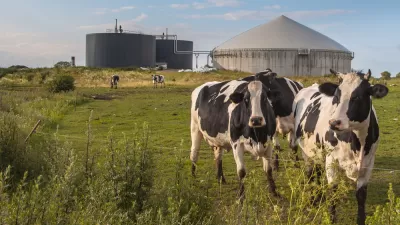California's Low Carbon Fuel Standard, which requires fuel producers to reduce the carbon intensity of transportation fuels by at least 10 percent by 2020, has been opposed by corn ethanol producers and the oil industry since its inception in 2011.

"A three-judge panel of the 9th U.S. Circuit Court of Appeals [in San Francisco] denied [on Jan. 19] a claim made by farm trade groups, fuel producers and American Trucking Associations that the California regulation violates the federal Commerce Clause and principles of interstate federalism by attempting to control commerce occurring outside the boundaries of the state," reports Eric Miller for Transport Topics.
The regulation, known as the Low Carbon Fuel Standard, was developed by the California Air Resources Board or CARB to fulfill a 2007 executive order [pdf] by Gov. Arnold Schwarzenegger (who also signed the state's landmark Global Warming Solutions Act of 2006) to reduce transportation emissions by making fuels cleaner.
What was particularly significant in the Jan. 19 ruling was the court's acknowledgment of the seriousness of the climate crisis and the urgency to address it.
“With its long coastlines vulnerable to rising waters, large population that needs food and water, sizable deserts that can expand with sustained increased heat, and vast forests that may become tinderboxes with too little rain, California is uniquely vulnerable to the perils of global warming,” the panel said.
“California should be encouraged to continue and to expand its efforts to find a workable solution to lower carbon emissions, or to slow their rise,” the appeals court said. “If no such solution is found, California residents and people worldwide will suffer great harm. We will not at the outset block California from developing this innovative, nondiscriminatory regulation to impede global warming.”
By "innovative," the panel may have been referring to the fact that the program is similar to cap-and-trade, also run by the CARB, in that it is market-based, allowing the trading of "credits" as an alternative to actually lowering carbon intensity.
Third time plaintiffs sued CARB on rule
This is not the first time the court has ruled on Rocky Mountain Farmers v. Corey [Richard Corey is the executive officer of CARB and the Rocky Mountain Farmers Union represents farmers and ranchers in Wyoming, Colorado, and New Mexico.]
The case went to the Supreme Court in 2014 after the plaintiffs, which includes the California Dairy Campaign ("Got Milk?") and the American Fuel & Petrochemical Manufacturers Association, one of the large cash donors to the successful campaign to defeat last year's Washington state carbon fee initiative, appealed a September 2013 decision by the Ninth Circuit. The high court declined to hear the case.
Justia U.S. Law, a website providing lawsuit information, explains that the plaintiffs challenged "three iterations" of the low carbon fuel standard, with the last one being in 2015.
Repeat Appeal to U.S. Supreme Court with Oregon's Clean Fuels Program
Last September, "the 9th Circuit rejected a similar claim [American Fuel & Petrochemical Manufacturers v. O’Keeffe] by some of the same trade groups in a case involving the state of Oregon’s low-carbon fuel program," adds Miller. "In that lawsuit, the groups claimed that the program was designed to benefit the local transportation fuel industry at the expense of out-of-state competitors."
"American Fuel & Petrochemical Manufacturers and American Trucking Associations have asked the U.S. Supreme Court to reject a [U.S. Ninth Court of Appeals] court ruling that upheld the state of Oregon’s program to reduce the carbon intensity of fuel by 10% by 2025," reported Andrew Harrer for Bloomberg News on Jan. 14 via Transport Topics.
Related in Planetizen – chronologically (it gets better with age)
-
CA's Low Carbon Fuel Standard Regulation Is Approved, April 28, 2009
-
Fed. Appeals Court Upholds CA's Low Carbon Fuel Standard, September 20, 2013
-
U.S. Supreme Court Declines to Hear Appeal on LCFS, July 2, 2014
FULL STORY: Appeals Court Rejects Challenge to California’s Low-Carbon Fuel Standard

Maui's Vacation Rental Debate Turns Ugly
Verbal attacks, misinformation campaigns and fistfights plague a high-stakes debate to convert thousands of vacation rentals into long-term housing.

Planetizen Federal Action Tracker
A weekly monitor of how Trump’s orders and actions are impacting planners and planning in America.

In Urban Planning, AI Prompting Could be the New Design Thinking
Creativity has long been key to great urban design. What if we see AI as our new creative partner?

King County Supportive Housing Program Offers Hope for Unhoused Residents
The county is taking a ‘Housing First’ approach that prioritizes getting people into housing, then offering wraparound supportive services.

Researchers Use AI to Get Clearer Picture of US Housing
Analysts are using artificial intelligence to supercharge their research by allowing them to comb through data faster. Though these AI tools can be error prone, they save time and housing researchers are optimistic about the future.

Making Shared Micromobility More Inclusive
Cities and shared mobility system operators can do more to include people with disabilities in planning and operations, per a new report.
Urban Design for Planners 1: Software Tools
This six-course series explores essential urban design concepts using open source software and equips planners with the tools they need to participate fully in the urban design process.
Planning for Universal Design
Learn the tools for implementing Universal Design in planning regulations.
planning NEXT
Appalachian Highlands Housing Partners
Mpact (founded as Rail~Volution)
City of Camden Redevelopment Agency
City of Astoria
City of Portland
City of Laramie





























